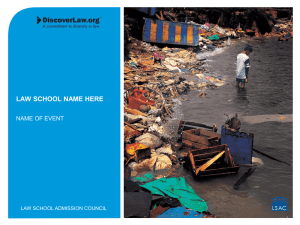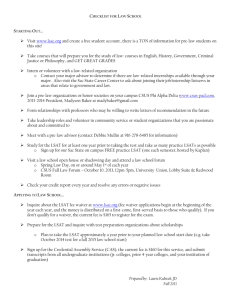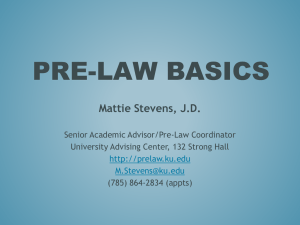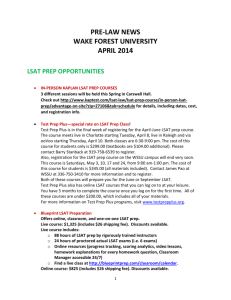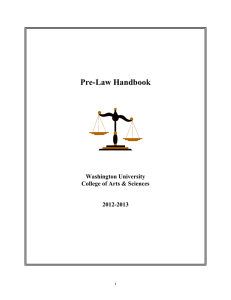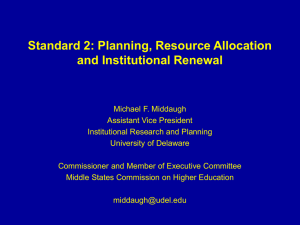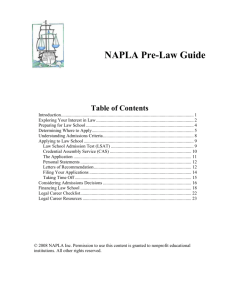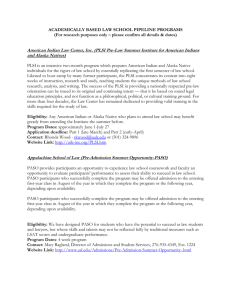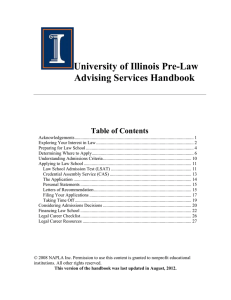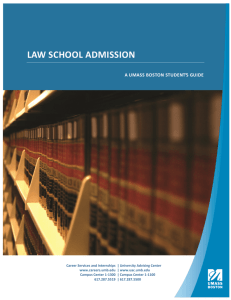Do Med schools do it better? - Duquesne University School of Law
advertisement
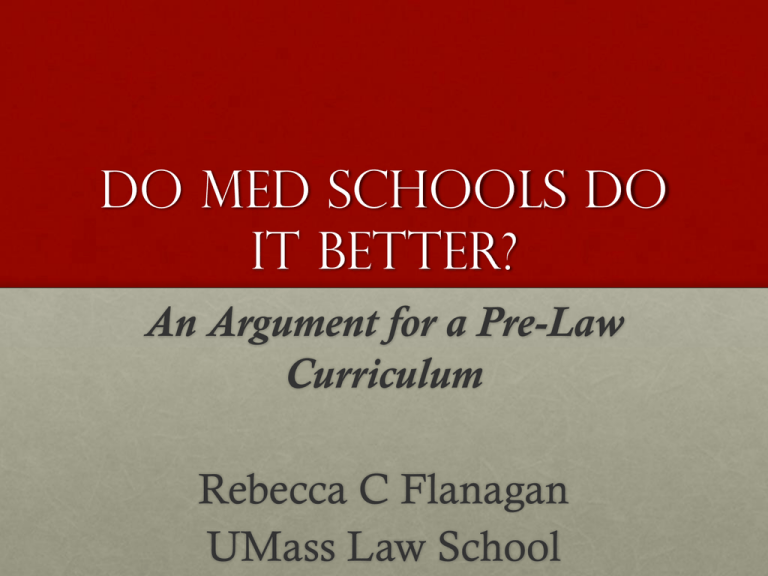
Do Med schools do it better? An Argument for a Pre-Law Curriculum Rebecca C Flanagan UMass Law School Introduction • 5 years as director of the Pre-Law Program at Uconn. • Worked closely with the director of PreMed Programs, Dr. Keat Sanford. Comparing law school and medical school • Think for a minute about the criticisms of legal education. • Now think about medical education. Can you think of criticisms of medical education? • What is the difference? Pre-law and pre-med: A comparison • Pre-med and holistic review • Academic requirements • Varies by school, but most require: • • • • Biology and Biochemistry General Chemistry and Organic Chemistry Social Sciences (Psychology, Sociology, or Anthropology) English • Medical School Admissions Test (MCATs) • Closed related to pre-med academic requirements • Clinical experience (Letters of Reference, Application) • History of service (Volunteer or extracurricular experience) • “Distance travelled” and Adversities Overcome (Interview) Pre-law and pre-med: A comparison • Pre-law prerequisites: • Academic Requirements: None • LSAT • Helpful (but not required) experiences: • Some idea of what lawyers do (beyond “Law and Order”) • Some volunteer experiences (do not need to be rigorous or consistent) Why we should adopt a pre-med model • Why now? • Declining enrollment and lack of entry level jobs…why now IS the time. • The problem of “practice-ready” graduates and foundational legal education • It’s not a lack of jobs…it’s the inability of newly-minted lawyers to meet the justice gap. • Practice-ready=more practice in law school • Before practice experience, students need to master foundational legal skills • MORE PRACTICE READY LAWYERS REQUIRES BETTER PREPARED LAW SCHOOL APPLICANTS. Mastering skills before professional school • Medical schools faced the same challenge law schools are now facing: how to better prepare grads in less time. • Med students must move to clinical experience by their third year (in some schools, even earlier) • Med schools, like law schools, face increasing knowledge, skills, and proficiencies, and less teaching time. • Requiring competencies before matriculation allows law schools to focus on practice-readiness. • Practice-ready grads will help stem the decline in law school enrollment. The Challenge: Skills and competencies • ABA pre-law website: • “does not recommend any any undergraduate majors or groups of courses” BUT • “applicants should develop…skills such as problemsolving, critical reading, writing, editing, oral communication and listening, research organization…background knowledge and exposure to law.” • LSAC pre-law advice: • “no particular undergraduate education is recommended.” Linking skills to courses • Some basic core skills will be easy to agree on: • • • • Basic writing skills, including grammar and style. Introductory informal and formal logic* Analytical reasoning Macro-and-micro economics/financial literacy • These skills could be matched with specific college courses that teach these skills Schools can augment the core skills with preferred skills, based on their needs and curriculum. The challenge: Collaboration • Law schools need to move from competitors to collaborators. • Medical schools have done this through the Association of American Medical Colleges (AAMS). • AAMC, in collaboration with the AMA, acts as a liaison between pre-med advisors, undergraduate institutions, and medical colleges. The challenge: logistics • This is more of a perceived challenge than an impediment. • Most undergraduate universities evaluate the skills associated with their courses to establish distributional and core requirements (sometimes called general education requirements). • LSAC already works with undergraduate institutions to evaluate transcripts and provide uniform GPAs to law schools. • LSAC and the ABA could operate as liaisons between prelaw advisors, undergraduate institutions, and law schools. Measuring skills: supplementing the lsat • Unlike the LSAT, the MCAT directly tests the skills and competencies taught in academic pre-requisites. • This process keeps standards high in pre-med courses. • Courses must provide students with knowledge to succeed on MCAT. • Prof.’s Shultz and Zedack from UC-Berkeley have created a test to supplement the LSAT, designed to test basic competencies not measured by the LSAT. • Many of these skills are the same that are foundational skills for legal education. Putting it together • Laws schools need to: • Collaborate on skills requirements • Work with the ABA and LSAC to classify undergraduate courses • Require undergraduate courses that teach the required knowledge, skills, and competencies. • Explore LSAT alternatives and supplements that provide a better measure of law student preparedness. Additional considerations: personal readiness and potential • Holistic review requires medical school admissions to look at more than academic readiness for medical education. • Applicants are required to participate in volunteer and clinical experiences. • Personal readiness and potential is measured by: • • • • American Medical College Application (AMCAS) Letters of Reference Essays Medical Admissions Interviews Admissions interviews • Medical schools conduct interviews of their top candidates. • Interview process provides a snapshot of student readiness. • More difficult to manipulate readiness in an interview by a team of admissions professionals than in an essay. What about secondcareer law students? • The rigorous undergraduate pre-med requirements require students to know they are pre-med by their sophomore year of college. • For career changer: post baccalaureate pre-medical programs. • As of Dec. 2014, 125 medical schools offered postbaccalaurate programs for career-changers. • Pre-law school programs could offer career changers the opportunity to prepare for law school. Where do we go from here? • Law schools are risking a race to the bottom as applications decline. • The race to the bottom threatens the legal profession. • Rethinking legal education may require uncomfortable changes in law school admissions. • Short-term discomfort could pay long-term dividends are law school graduate better-prepared, practice ready graduates.
